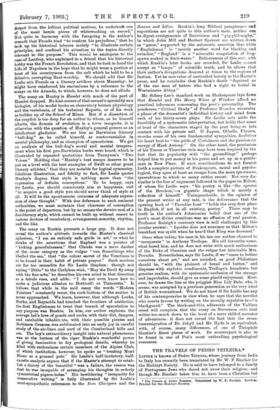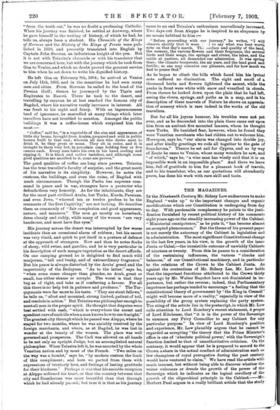THE TRAVELS OF PEDRO TEIXEIRA.* LITTLE is known of Pedro
Teixeira, whoee journey from India to Italy has recently been translated by Mr. W. F. Sinclair for the Hakluyt Society. He is said to have belonged to a family of Portuguese Jews who dared not avow their religion; and though Mr. Sinclair takes him to have been a Christian but
• The Travels of Pedro Teixeira. Translated by W. F. Sinclair. London Printed for the Ilakluyt Society. "from the teeth out," he was no doubt a professing Catholic. When his journey was finished, he settled at Antwerp, where he gave himself to the writing of history, of which be had, he tells us, always been a student. His Chronicle of the Kings of Hormuz and the History of the Kings of Persia were pub-
lished in 1610, and presently translated into English by Captain John Stevens, an industrious knight of the pen. But it is not with Teixeira's chronicle or with his translator that we are concerned here, but with the journey which he took from Goa to Venice, and which no doubt proved the greatest service to him when he sat down to write his dignified history.
He left Goa on February 9th, 1604; he arrh ed at Venice on July 11th, 1605, and in the meantime he had seen many
men and cities. From Hormuz he sailed to the bead of the Persian Gulf ; thence he journeyed by the Tigris and
Euphrates to Basora. There he took to the desert, and travelling by caravan he at last reached the famous city of Bagdad, whore his narrative vastly increases in interest. All was fresh to his sight and fancy. With an ingenuousness bred of ignorance, he marvelled at many things which later travellers have not troubled to mention. Amongst the public buildings it was a coffee-house which surprised him the most :—
" Coffee," said he, "is a vegetable of the size and appearance of little dry beans, brought from Arabia, prepared and sold in public houses built to that end ; wherein all men who desire meet to drink it, be they great or mean. They sit in order, and it is brought to them very hot, in porcelain cups holding four or five ounces each. Every man takes his own in his hand, cooling and sipping it. It is black and rather tasteless, and although some good qualities are ascribed to it, none are proven."
The good qualities of coffee are long since proven. Teixeira has the true traveller's faculty of surprise, and the great merit of his narrative is its simplicity. However, he notes the customs, the buildings, and even the ruins, of Bagdad with much circumstance. Though the Pacha has supreme com- mand in peace and in war, strangers have a protector who defends them very honestly. As for the inhabitants, they are for the most part civilised Arabs, but Tu.rks, Kurds, Persians, and even Jews, "whereof ten or twelve profess to be the remnants of the first Captivity," are not lacking. He describes them as commonly of "fair complexion and good appearance, nature, and manners." The men go mostly on horseback, dress cleanly and richly, while many of the women "are very handsome, and most have fine eyes."
His journey across the desert was interrupted by few worse
incidents than an occasional alarm of robbers ; but his escort was very timid, and quick to put itself in a posture of defence at the approach of strangers. Now and then he notes flocks of sheep, wild swine, and gazelles, and he is very particular in his description of such meagre vegetation as the desert affords.
On one camping ground he is delighted to find much wild marjoram, "tall and bushy, and of extraordinary fragrance." But his peace is always disturbed by the Arabs' greed and the
importunity of the Beduynes. "As to the latter," says he, "when arms come cheaper than plunder, no Arab, great or small, has either shame or scruple. The worst is that they beg as of right, and take as if conferring a favour. For all
this there is no help but in patience and prudence." The Tar- quymanis were far more to his taste. "They are stout fellows," he tells us, "afoot and mounted, strong limbed, patient of toil,
and resolute in action." But Teixeira was philosopher enough to meet all men in the proper spirit. He thought that disputes were beat settled with cash, "which is everywhere the surest and speediest cure of such ills when a man knows how to use it aright."
The greatest city through which he passed was Aleppo, where he
stayed for two months, where he was amiably received by the foreign merchants, and where, as at Bagdad, he was lost in wonder at the beauty of the women. The place was well
governed and prosperous. The Cadi was allowed on all hands to be not only an upright Judge, but an accomplished natural
philosopher. When Teixeira left it, he was escorted by the whole Venetian nation and by most of the French. "Two miles on the way was a hamlet," says he, " by modern custom the limit of this compliment ; and here we parted from them with
expressions of brotherly love, and feelings of lasting gratitude for their kindness." Perhaps it was that his amiable reception at Aleppo softened his heart, or that the country between that city and Scandarona was more beautiful than that through which he had already passed; but true it is that as his journey came to an end Teixeira's enthusiasm marvellously increased.
Two days out from Aleppo he is inspired to an eloquence by no means habitual to him :— " Before proceeding with our journey," he writes, "I will observe shortly that it were ; 1 to say what was best worth note on that day's march. Th.:. surface and quality of the land, the scenery, the various flowers and their fragrance, the several birds and their songs, the springs and rivers, the lakes, and the cattle at pasture, all demanded our admiration. It was spring time ; the climate temperate, the air pure, and the land good and fertile; so one may conceive our pleasure, and for how ranch we had to praise God."
As be began to climb the hills which faced him his lyrical note suffered no diminution. The sight and smell of a thousand herbs and flowers lightened the ascent, while the peaks in front were white with snow and wreathed in clouds. From thence he looked down upon the plain that he had left, seeing the rivers, springs, and paths as in a map, and in hia
description of these marvels of Nature he shows an apprecia- tion of scenery which is rare indeed in the works of the old travellers.
But for all his joyous humour, his troubles were not yet over, and as he descended into the plain there came out upon him from an ambush five mounted lancers, whom he thought were Turks. He banished fear, however, when he found they were Venetian merchants who had ridden out to welcome him.
Hereupon, says he, "our alarm was changed into double joy, and after kindly greetings we rode all together to the gate of Scaniarona." Thence he set sail for Cyprus, and so by way of Zante he came to Venice, whose many wonders he saw, and "of which," says he, "a wise man has wisely said that it is an impossible work in an impossible place." And there we leave him, full of gratitude to him for a pleasant book of travels, and to his translator, who, as our quotations will abundantly prove, has done his work with rare skill and taste.











































 Previous page
Previous page